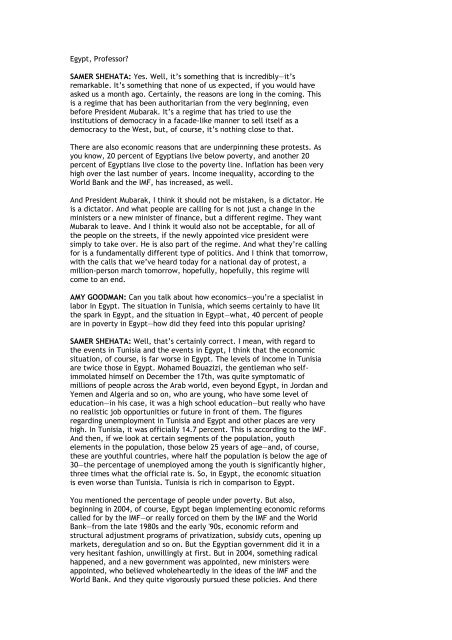April 2011 - Centre for Civil Society - University of KwaZulu-Natal
April 2011 - Centre for Civil Society - University of KwaZulu-Natal
April 2011 - Centre for Civil Society - University of KwaZulu-Natal
You also want an ePaper? Increase the reach of your titles
YUMPU automatically turns print PDFs into web optimized ePapers that Google loves.
Egypt, Pr<strong>of</strong>essor?<br />
SAMER SHEHATA: Yes. Well, it’s something that is incredibly—it’s<br />
remarkable. It’s something that none <strong>of</strong> us expected, if you would have<br />
asked us a month ago. Certainly, the reasons are long in the coming. This<br />
is a regime that has been authoritarian from the very beginning, even<br />
be<strong>for</strong>e President Mubarak. It’s a regime that has tried to use the<br />
institutions <strong>of</strong> democracy in a facade-like manner to sell itself as a<br />
democracy to the West, but, <strong>of</strong> course, it’s nothing close to that.<br />
There are also economic reasons that are underpinning these protests. As<br />
you know, 20 percent <strong>of</strong> Egyptians live below poverty, and another 20<br />
percent <strong>of</strong> Egyptians live close to the poverty line. Inflation has been very<br />
high over the last number <strong>of</strong> years. Income inequality, according to the<br />
World Bank and the IMF, has increased, as well.<br />
And President Mubarak, I think it should not be mistaken, is a dictator. He<br />
is a dictator. And what people are calling <strong>for</strong> is not just a change in the<br />
ministers or a new minister <strong>of</strong> finance, but a different regime. They want<br />
Mubarak to leave. And I think it would also not be acceptable, <strong>for</strong> all <strong>of</strong><br />
the people on the streets, if the newly appointed vice president were<br />
simply to take over. He is also part <strong>of</strong> the regime. And what they’re calling<br />
<strong>for</strong> is a fundamentally different type <strong>of</strong> politics. And I think that tomorrow,<br />
with the calls that we’ve heard today <strong>for</strong> a national day <strong>of</strong> protest, a<br />
million-person march tomorrow, hopefully, hopefully, this regime will<br />
come to an end.<br />
AMY GOODMAN: Can you talk about how economics—you’re a specialist in<br />
labor in Egypt. The situation in Tunisia, which seems certainly to have lit<br />
the spark in Egypt, and the situation in Egypt—what, 40 percent <strong>of</strong> people<br />
are in poverty in Egypt—how did they feed into this popular uprising?<br />
SAMER SHEHATA: Well, that’s certainly correct. I mean, with regard to<br />
the events in Tunisia and the events in Egypt, I think that the economic<br />
situation, <strong>of</strong> course, is far worse in Egypt. The levels <strong>of</strong> income in Tunisia<br />
are twice those in Egypt. Mohamed Bouazizi, the gentleman who selfimmolated<br />
himself on December the 17th, was quite symptomatic <strong>of</strong><br />
millions <strong>of</strong> people across the Arab world, even beyond Egypt, in Jordan and<br />
Yemen and Algeria and so on, who are young, who have some level <strong>of</strong><br />
education—in his case, it was a high school education—but really who have<br />
no realistic job opportunities or future in front <strong>of</strong> them. The figures<br />
regarding unemployment in Tunisia and Egypt and other places are very<br />
high. In Tunisia, it was <strong>of</strong>ficially 14.7 percent. This is according to the IMF.<br />
And then, if we look at certain segments <strong>of</strong> the population, youth<br />
elements in the population, those below 25 years <strong>of</strong> age—and, <strong>of</strong> course,<br />
these are youthful countries, where half the population is below the age <strong>of</strong><br />
30—the percentage <strong>of</strong> unemployed among the youth is significantly higher,<br />
three times what the <strong>of</strong>ficial rate is. So, in Egypt, the economic situation<br />
is even worse than Tunisia. Tunisia is rich in comparison to Egypt.<br />
You mentioned the percentage <strong>of</strong> people under poverty. But also,<br />
beginning in 2004, <strong>of</strong> course, Egypt began implementing economic re<strong>for</strong>ms<br />
called <strong>for</strong> by the IMF—or really <strong>for</strong>ced on them by the IMF and the World<br />
Bank—from the late 1980s and the early '90s, economic re<strong>for</strong>m and<br />
structural adjustment programs <strong>of</strong> privatization, subsidy cuts, opening up<br />
markets, deregulation and so on. But the Egyptian government did it in a<br />
very hesitant fashion, unwillingly at first. But in 2004, something radical<br />
happened, and a new government was appointed, new ministers were<br />
appointed, who believed wholeheartedly in the ideas <strong>of</strong> the IMF and the<br />
World Bank. And they quite vigorously pursued these policies. And there
















